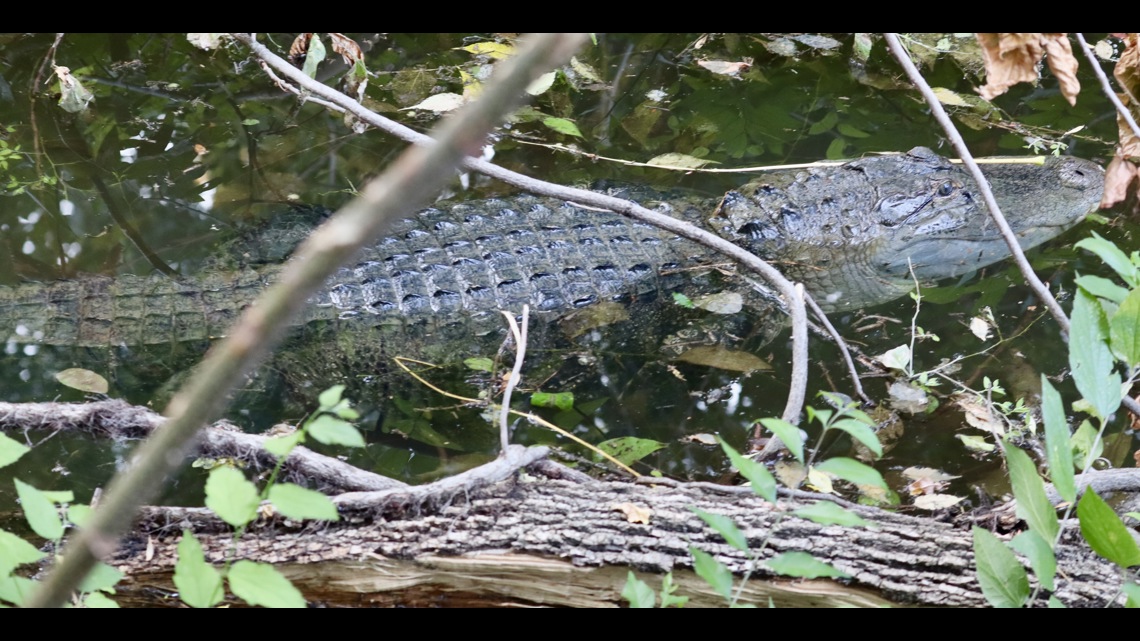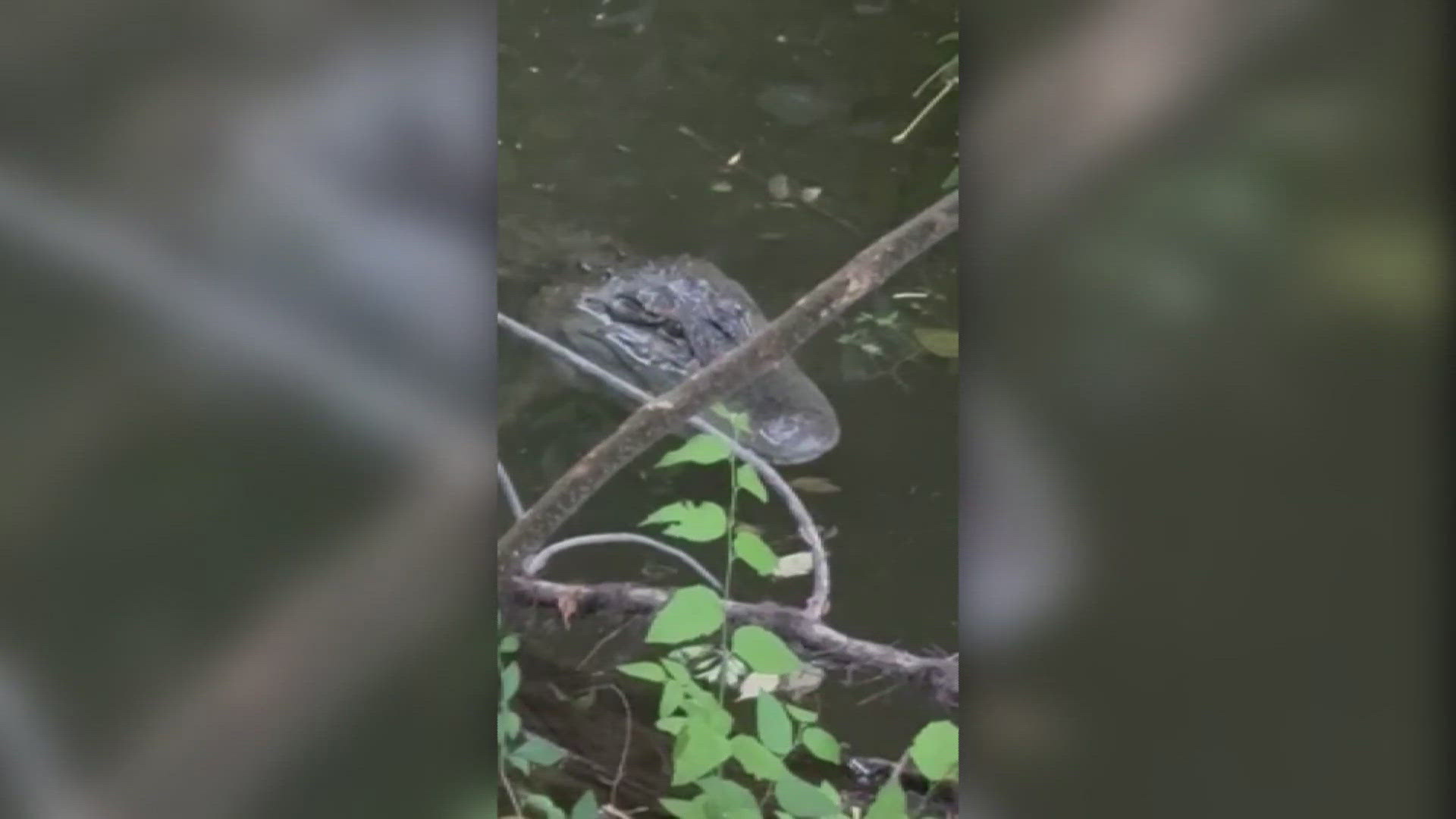COPPELL, Texas — An alligator has been spotted in a North Texas town.
The City of Coppell announced a gator sighting in the northeastern portion of the town. The city says it's been seen in small ponds and tributaries around Denton Creek.
For the time being, city officials are asking residents to avoid swimming, fishing and entering the water in that area.
They're also urging residents not to feed the gator. Under Texas law, feeding a gator in the wild is a misdemeanor that comes with a $500 fine.
The City of Coppell says they are in contact with Texas Parks and Wildlife. Alligators are a regulated species, so the city cannot relocate the reptile without their permission.
So far, there's no word on how big the gator is.
This isn't the first alligator spotted in North Texas, and it won't be the last. Reports of gators in DFW waterways date back to the 1800s. As a native species, they've been in the area for hundreds of years.


What to do if you see an alligator
Here are guidelines of what to do if you see an alligator, per TPWD:
- If the alligator is not approaching people or otherwise posing an obvious threat, wait a few days if possible - even up to a week - before contacting TPWD. In spring and summer, alligators are moving to breed and find new habitats. Most of the alligators moving around are smaller ones that have been pushed out of their normal habitat by larger alligators. Usually, these smaller alligators will move further on in a week or two.
- If you hear an alligator hiss, it's a warning that you are too close.
- Alligators have a natural fear of humans and usually begin a quick retreat when approached by people. If you have a close encounter with an alligator a few yards away, back away slowly. It is extremely rare for wild alligators to chase people, but they can run up to 35 miles per hour for short distances on land. Never make the mistake of thinking that an alligator is slow and lethargic. Alligators are extremely quick and agile and will defend themselves when cornered. A female protecting her nest might charge a person who gets close to the nest, but she would quickly return to the nest after the intruder left.
- It is not uncommon for alligators to bask along the banks of a pond or stream for extended periods of time. These alligators are usually warming their bodies; they are not actively hunting. Often times a basking alligator may be seen with its mouth open; this is a way to cool its body temperature down, since alligators do not pant or sweat. An approaching human should cause these alligators to retreat into the water. (In some cases, the alligator may be protecting a nest - see below.) However, an alligator may be considered a nuisance if it leaves the banks of the water body to spend time near homes, livestock pens, or other structures.
- If you walk near the water and an alligator comes straight toward you, especially if it comes out of the water, it is definitely a nuisance alligator that needs to be reported to TPWD. In many cases, these are alligators that have been fed by people or have been allowed to get human food.
- If you see an alligator while walking a pet make sure that your pet is on a leash and under your control. Your pet will naturally be curious, and the alligator may see an easy food source. Alligators have a keen sense of smell. In areas near alligator sightings, it is wise to keep pets inside a fenced area or in the house for a few days, during which the alligator will often move on.
- If you see an alligator in the roadway, DO NOT attempt to move it! Notify local authorities so the alligator can be handled safely.
- If you see a large alligator in your favorite swimming hole or pond, do not swim with it. Although alligator attacks in Texas are rare, they can happen. The "attack" reports in Texas are usually more accurately described as "encounters." As with all outdoor activities, realize that wildlife encounters are a possibility.
- It is not uncommon for alligators to pursue top-water fishing lures, and this activity does not constitute a threat to humans. As with fish, alligators are attracted to these lures because they mimic natural food. Most alligators can be easily scared away from boats or fishing lures. However, alligators that repeatedly follow boats, canoes, or other watercraft, and/or maintain a close distance without submersing may be considered nuisance alligators.
- If you see a nuisance alligator, consider why it is there. Did someone clean fish and throw the heads into a pond or river? If so, they created a potential alligator problem and could be breaking state regulations. Since October 1, 2003, it has been a Class C misdemeanor punishable by a fine of up to $500 for anyone caught feeding an alligator.
Alligator Dos and Don'ts
Do
- Call your TPWD regional office if you encounter a nuisance gator that has lost its fear of people.
- Closely supervise children when playing in or around water.
- Use ordinary common care. Swim only during daylight hours.
- Inform others that feeding alligators creates problems for others who want to use the water for recreational purposes.
- Dispose of fish scraps in garbage cans at most boat ramps or fish camps.
- Enjoy viewing and photographing wild alligators from a safe distance of at least 30 feet or more. Remember that they're an important part of Texas's natural history, as well as an integral component of many wetland ecosystems.
Don't
- Kill, harass, molest, or attempt to move alligators. State law prohibits such actions, and the potential for being bitten or injured by a provoked alligator is high.
- Allow small children to play by themselves in or around water.
- Swim at night or during dusk or dawn when alligators most actively feed.
- Feed or entice alligators. Alligators overcome their natural shyness and become accustomed or attracted to humans when fed. It is now a Class C misdemeanor, punishable by a fine of up to $500, to intentionally feed an alligator.
- Throw fish scraps into the water or leave them on shore. Although you are not intentionally feeding alligators, the end result can be the same.
- Remove any alligators from their natural habitat or accept one as a pet. It is a violation of state law to do so. Alligators do not become tame in captivity and handling even small ones may result in bites. In particular, never go near baby alligators or pick them up. They may seem cute and harmless, but mama alligator will be nearby and will protect her clutch for at least two years.

